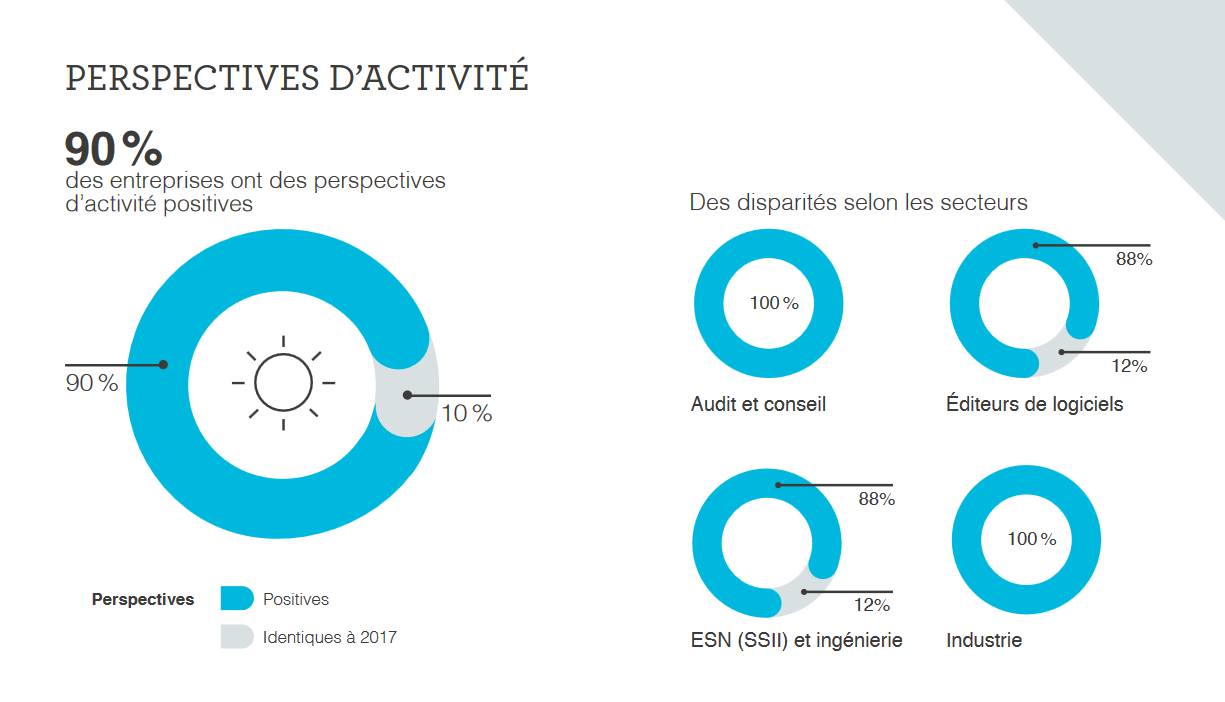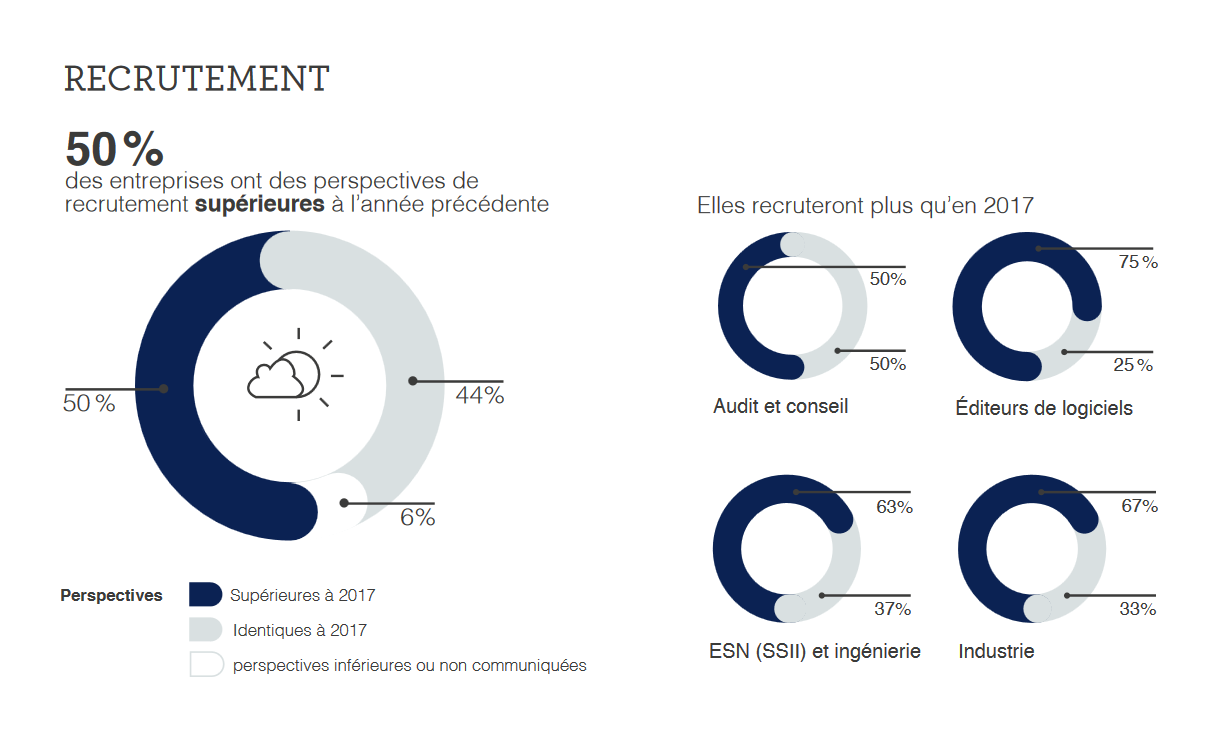10th Business Tendency Barometer for the Telecommunications Forum: Big Data and Cybersecurity Continue to Generate More Jobs
Big data, cybersecurity, artificial intelligence… Employment prospects remain positive for graduates in digital technology and telecoms engineering. Here are the major trends revealed by the 10th IMT Barometer, created for the Telecommunications Forum held on February 15, 2018 in Paris.
The economic recovery is very positive for digital careers
The start of the year confirms the recovery that began in 2016: 90% of companies surveyed showed positive business forecasts, while the rest expect to conserve their current results. In this very favorable context, 50% of surveyed employers plan to hire more than in 2017, and 44% expect recruitment to stabilize.
Digital services companies accelerate
 The economic crisis now seems like ancient history, especially for software publishers: 75% intend to boost their recruitment in 2018. Telecoms and electronics industries rank strongly in this competitive recruitment environment (67%), as do digital services companies and engineering consultancy firms. Alten expects a 25% increase in the recruitment of engineers, like other engineering and IT service companies: + 1,000 for Devoteam and +2,700 for Sopra Steria.
The economic crisis now seems like ancient history, especially for software publishers: 75% intend to boost their recruitment in 2018. Telecoms and electronics industries rank strongly in this competitive recruitment environment (67%), as do digital services companies and engineering consultancy firms. Alten expects a 25% increase in the recruitment of engineers, like other engineering and IT service companies: + 1,000 for Devoteam and +2,700 for Sopra Steria.
The emergence of major Internet stakeholders is also creating new opportunities. Vente-Privée has announced that it will hire 300 people in the coming months, primarily in R&D: customer experience, customization of the offer, speeding up deliveries… These are all challenges that require teams of engineers and developers, and the company now wants to internalize them.
A different situation is in evidence in audit/consulting and telecoms service providers. According to the IMT Barometer, less than half of the consulting firms surveyed plan to step up recruitment.
As in previous years, companies’ needs are concentrated on technical professions. “The study and the development of software and networks” is the top demand in almost every sector. Recruitment is targeted in this area among digital services companies (23% of needs) and software publishers (20%). “Architecture and engineering” careers take a close second, representing nearly a quarter of demand among telecoms and electronics industries, and 19% of demand among digital services companies.
 Cybersecurity skills greatly sought after
Cybersecurity skills greatly sought after
Across all sectors, cybersecurity represents 9% of the demand for skills. Needs in this area are most critical among audit/consulting firms (13%), telecom service providers (12%) and software publishers (10%). And digital services companies are not lagging behind. “With the growth of cloud solutions and the SaaS model, data security issues are becoming crucial,” says a representative from Devoteam. Data security, whether in infrastructure or software, has a very promising future and is facing many challenges: data encryption, software protection, detection of vulnerabilities, etc.
The proliferation of connected objects is also boosting demand to combat cybercrime. At Renault, security has become a new challenge and teams are being set up to focus on this issue. The connected and autonomous vehicles of the future will be vulnerable to remote attacks. All manufacturers and their suppliers will need to strengthen their IT security resources.
New cyber-attack threats affect all sectors. Digital services companies have observed a growing need in the bank/insurance sector, which is investing heavily in protection systems.
Defense sector activities are also very vulnerable. Cybersecurity experts will hold a prominent place among the 1,000 people the Naval Group (former DCNS) wants to recruit.
Big Data: Highly Promising Careers
Another prominent career of the future is that of big data analysis specialists. Increased demand in this area goes hand in hand with the growth of web platforms which will continue to generate huge amounts of digital data. Currently, according to the IMT Barometer, this career represents 8% of companies’ demand across all sectors. This percentage is even as high as 11% among audit/consulting firms and telecoms and electronics industries.
Big data experts are also very popular among digital services companies, and among major companies like Amazon. The American group, which was present at the Telecommunications Forum for the first time, is looking for research engineers as it continues to grow its French workforce.
AI: Growing Needs
Despite all the attention it receives, artificial intelligence only represents 6% of demand for skills. Yet, by all accounts, the need for specialists in AI will increase. The development of these future technologies requires experts in machine learning and data. AI has become a priority research area for Microsoft France, which was present this year at the Forum to recruit developers for its R&D center in Issy-les-Moulineaux.
The Internet of Things (IoT) is another area of rapid growth. These skills are most sought after among digital services companies, audit/consulting firms, and telecoms and electronics industries. Finally, superfast broadband technology is also generating new jobs for engineers. These engineers will work on studying and managing fiber network deployment. According to Altran, these projects are clearly boosting recruitment in telecom careers. With the development of big data, service providers need networks with sufficiently high data rates.
Methodology
62 of the companies present at the Telecommunications Forum at Paris-Porte de Versailles on February 15, 2018 replied to the questionnaire. Sectors Represented: Audit/consultancy, telecoms service providers, telecoms and electronics industry, digital services companies and engineering, other industries, non-digital company services.
A survey conducted since 2009
The Telecommunications Forum (organized by the “Forum des Télécommunications” Association, composed of students from Télécom Paris, Télécom SudParis and Télécom Ecole de Management) allows students to meet representatives from around one hundred companies from a wide range of sectors (new technologies, banking, insurance, audit, consultancy, and automotive) that have recruitment needs for engineering graduates. Since 2009, the Career Observatory conducts a business tendency survey with the companies present in order to identify the tendencies for the current year.

























